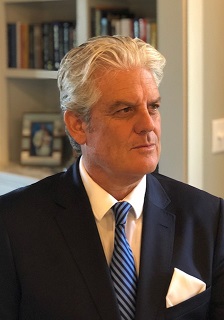From the CEO – September 2019

Dear Clients,
Just as ICRG was sending its data requirements for the month to clients, a new chapter opened in what appears to be a never-ending news and political cycle targeting President Trump for apparent wrongdoings. This time the alleged offenses stem from a series of allegations from the now-infamous ‘whistleblower’ over a phone call between Trump and Volodymyr Zelensky, the newly-elected president of Ukraine.
Most following this story know its overall thrust. But the allegations that have received the most attention revolve around the idea that President Trump abused his presidential authority by attempting to ‘influence’ Zelensky to open an investigation into the business dealings of Joe Biden’s son in the country. The story goes that Biden’s son chased business opportunities with foreign parties, apparently in ways that ‘intersected’ with his father’s work after Joe became vice-president. Trump’s inducement is apparently $400 million in military aid.
In the ‘whistleblowers’ allegations, the main point was that several US officials informed Ukrainian officials that a meeting between the two presidents would depend on whether Zelensky was willing to ‘play ball’ on issues that had been discussed by former Ukraine prosecutor general Yuriy Lutsenko and Rudy Giuliani, Trump’s personal lawyer. Again, the issues were the investigation of Biden’s son’s business dealings.
There are other, somewhat related, accusations, and Trump was quick to call for the resignation of Adam Schiff, the Democratic lawmaker heading up the House’s impeachment efforts, saying the chairman of the Intelligence Committee misrepresented the president’s conversation with Ukraine’s leader. The president later tweeted that Schiff “fraudulently read to Congress” a version of a July 25th call with Ukraine’s president. Trump said he “was supposedly reading the exact transcribed version of the call, but he completely changed the words” to make it sound worse. Schiff said he was not reading from the transcript.
In any case, the point of all of this is that the controversy so far has barely had any impact on any of the major tradable asset markets. While things were happening in DC, all US indices were up strongly, fueled in part by news that US-China trade talks are set for next month, and possibly due to the partial cease-fire declared in Yemen between Riyadh and Houthi militants. In other words, events that have an impact on commerce, trade, international relations and investment. The possibility of impeachment – which is very remote at this point in time – appears quite benign.
The distinction between the impeachment efforts and the international issues above underscores what most longstanding practitioners in political risk (including traders, portfolio managers, and international entrepreneurs) have known for some time: There is a difference between the relatively benign influence of political noise and the larger political events that have a discernible effect on the behavior of various asset classes. It’s the kind of duality that we see in other disciplines, such as religion and art, from Dharma Kirti’s notion of dualism between states of consciousness and the quantitative nature of Buddhist atomism, to the longstanding tradition of duality in art history, which is largely dependent on the viewer’s interpretation.
ICRG has long been aware of this facet of political risk. As clients know, ICRG considers political risk along a number of quant-based continuums, utilizing a number of different and complementary metrics, and a time series that extends almost four decades. This is why our data is so well suited to correlation analysis and various machine learning/AI applications. And as I have said before on various occasions: ‘Talking heads’ and ‘expert opinion’ has its place in political risk analysis. But in order to become meaningful, political risk has to be quantified over time and between jurisdictions, and when it is applied to the behavior and protection of assets.
Turning to our coverage for the month, in Iran, it is difficult to explain why the country would make such a provocative move as launching direct missile strikes on Aramco’s facilities in Saudi. If proven, Iran’s perpetration of an act of belligerence inside the Saudi Kingdom could not help but undermine the justification of the European powers for providing the country with a way of working around the US sanctions, while increasing the risks for those countries, such as China, that have largely ignored the sanctions and continue to purchase oil from Iran.
In any event, we warned clients months ago that an attack of this sort was clearly possible.
On the economic front, the impact of the sanctions on Iran has been devastating. Oil exports are reportedly down by more than 80% from historical levels, and there are indications that the domestic economy is close to collapse. The rial – the currency – has tanked, unleashing inflation, which hit 52.1% (year-on-year) in May.
Iran has been one of the worst performing countries in the ICRG universe over the past year.
Naturally, turning to Yemen, there remains a myriad of potential risks spewing from the conflict for investors to weigh up, notwithstanding the announced partial cease-fire, especially given that the UN is willing to pursue war crimes against perpetrators. That France, the UK and the US supply arms to the conflict is instructive.
On a more uplifting note, Greece’s New Democracy returned to power in a July vote, capturing 39.9% of the electorate, granting it 158 seats (83 more than previously) in the 300-member unicameral legislature. Syriza came in second with 31.5% support, losing 59 seats, producing a new total of 86.
On the policy front, Prime Minister Mitsotakis and his Finance Minister, Christos Staikouras, both have extensive banking experience, and have indicated they will focus on supply-side enhancing tax cuts and other market-friendly policies to attract more foreign direct investment (FDI) to create jobs, notably for the disenfranchised youth, many of whom were forced to emigrate to escape the economic crisis. The government’s vision, and the feelgood factor it is creating, has seen business confidence revive, and asset prices soar to their highest since the crisis began, ably assisted by an economy still growing.
As always, ICRG data figures prominently in the academic and applied literature. A recent study by IMF staff, using our ICRG data, considered the impact armed conflict on the current account (CA) and exchange rate. Controlling for other CA determinants, the estimates suggest that the marginal impact of an armed conflict is to raise the current account by 1% of GDP.
Additionally, practitioners have found that, using ICRG risk data, political risk is more pronounced on floating exchange rates versus managed/fixed regimes. Market volatility in both emerging and developed markets is influenced by our major ICRG risk metrics.
I would also like to welcome some new clients this month, including additional US and European-based institutional investors and hedge funds, along with the University of Delaware, Tulane University, University of Malaya, Istanbul Commerce University, Fundação Getúlio Vargas, and the State of Wisconsin Investment Board.
Our clientele among asset managers continues to grow, with our data now be used by world’s largest investors with over $12 trillion in combined assets under management! Thank you!
I will be meeting National Treasurer Rosalia De Leon and Deputy Central Bank Governor Francisco Dakila of the Philippines on October 16 in Washington. The discussion will center around PRS’ ratings, the components and implications of the PRS/ICRG risk methodology, and the Philippines’ efforts to improve certain risk metrics. All signals point to a very informed and enjoyable meeting.
PRS will soon unveil its new Preferred Client Advantage. The program offers new and existing clients a greater diversity of data offerings and timing along with regular updates, consultations, bundled products, and more. Look for details in early October.
In the fall, Peter Marber (Aperture Investors, Harvard) and I will release a new book on political risk, titled: Quid Periculum: Measuring and Managing Political Risk in the Age of Technology. The new book will include new material from leading experts in the field, as well as a round-table discussion from Ted Merz (Bloomberg), Price Lowenstein (Sovereign), and Michel-Henri Bouchet (Skema, Paris), among others.
Finally, PRS and Bulgaria’s University of National and World Economy (UNWE) are in the early stages of a joint venture that will see the creation of an executive training center for political risk established at UNWE. A global conference on political risk is also planned, as are a number of related activities. All sides are looking forward to bringing this enterprise to fruition.
Clients should note that under 90 countries were affected with risk scoring changes in September, affecting some 112 individual political risk metrics.
Thanks for your continued support, and please contact us if we can be of any assistance.

Chief Executive

PRS INSIGHTS
Moving beyond current opinions, a seasoned look into the most pressing issues affecting geopolitical risk today.
EXPLORE INSIGHTS SUBSCRIBE TO INSIGHTS




